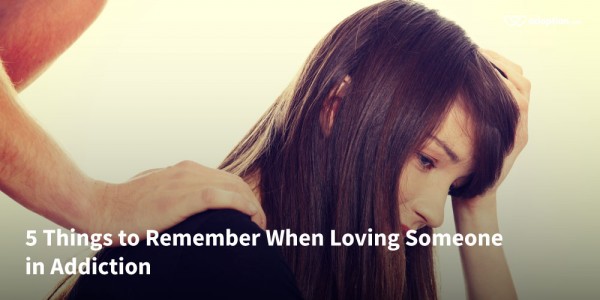Addiction doesn’t discriminate. It can happen to anyone. Loving someone in addiction is difficult. Understanding something you haven’t experienced is hard. You may question, “How did they ever let it get this bad?” or “Everyone knows heroin is dangerous!” So how do you balance your love for the addict without condoning the actions of the addict? How do you keep them an active member of your life without allowing addiction to rule your life?
I lost my brother and his wife to addiction; every day I question if I could have done more to save them. My sister is also an addict whose path has dictated the need for her daughter to live with me. I fear for her well-being and crave the relationship we had before addiction changed her. Addiction has been a large part of my family’s history and shaped current events and relationships. Childhood trauma, mental illness, predisposition, unhappiness, or injury can lead anyone to addiction. There are a few things I have to consistently remind myself about loving someone in addiction.
1. Addiction is a disease.
Keep in mind that once addiction takes hold of a person, the disease of addiction triggers the person in ways we may not be able to understand. The physical dependence on the substance or activity changes their personality, behaviors, and life. Stopping the substance may cause an addict pain, sickness, or even death if not done with help from a professional. The fear or pain of withdrawal often prevents an addict from stopping, no matter how much they want to end their addiction.
2. Loving the addict doesn’t mean loving the addiction.
It is really hard to separate the person from the disease. We see our loved one making poor choices and turning into a shell of a person we used to know. He or she may become violent, steal, lie, or cheat because of the addiction. We can still love the person, pray for the person, and support the person, all while recognizing that the addiction has created a monster. I have heard countless times about the shame that comes with addiction, and also that addicts do still know right from wrong; however, addiction drives people to do things they may not otherwise do, or intensifies underlying personality traits. Letting the addict in your life know you love them and that you are there to talk or support them in recovery may be the only way to help.
3. Love, but don’t enable.
Many times friends and family members of addicts don’t know the difference between loving and enabling. This was a particularly hard lesson for me to learn. I thought I could fix all of my sister’s problems with things money could buy: rehab, treatment, housing, food, a good life in our home. Unfortunately, addicts have to want recovery more than they want anything else. We can provide all the resources in the world, but until they are truly ready and in the right frame of mind, we can’t beat the addiction for them. My “help” turned into enabling. My sister no longer had to fight in life. She had everything covered for her and her limited income was then able to go toward unnecessary luxuries—and then drugs. Love the person, but don’t make their addiction easy by providing them with everything they need.
4. You can’t do it for them.
You will make yourself crazy if you think you can force the addict in your life into sobriety. Every addict is different. Sometimes the first time someone points out the addiction, the addict is able to get control and take back his or her life. Other people will enter rehab over and over only to relapse each time. Others refuse to acknowledge the addiction and think it is everyone else who has a problem, or they are just “no fun.” No matter what the circumstance, you cannot beat the addiction for them. No matter how much you love them, support them, and pray for them, they still have to take the steps necessary to beat their illness.
5. Sometimes loving means letting go.
When the person’s addiction begins to take over your life, happiness, and health, you need to step back and realize that this is something they have to do for themselves. Give them love and support and then step back and let them take the reins. Walking away from a person we love is not easy. We may worry. We may crave the connection to that person for ourselves or for our children. Everyone reacts differently to addiction, but when we have given it our all and it’s still not enough, we need to step back before caring for the the addict becomes our own addiction. Understanding that addiction is a disease that can’t be loved away will help us in knowing that we are doing everything in our power to help. If we have to set boundaries, limit contact, or temporarily walk away, we can do so by letting the addict know what we are doing and why. When they are ready for help or have achieved sobriety, they know where to find us.
If you or a loved one is battling addiction and are ready for help, some addiction recovery services are available to you right around the corner. A national search and help website that can get you started is the Substance Abuse and Mental Health Services Administration. If you love an addict or have lost a loved one to addiction, seeking support and education through group meetings or therapy will help you get a handle on the disease and guide you in navigating your relationship with the addict.

